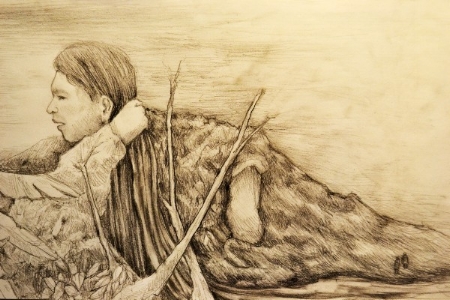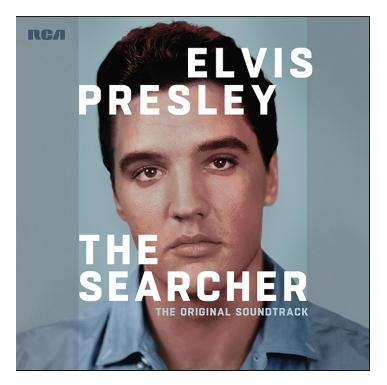In this post, current OHMA student Storm Garner muses on Maria Cotera's presentation of the concept of an "embodied archive" using tattoos as an illustration.
Where Do We Go from Here? An Evening with Maria Cotera
In the first workshop of this year’s series, Maria Cotera spoke about her work with students within the academy to create an interactive archive decidedly outside of the bounds of the academy. In this piece Valerie Fendt wonders aloud what the future relationship might be between institutions of learning and a pedagogy built up from outside them.
“There’s a lot of eating that goes on!”
In this piece, current OHMA student Rebecca Kiil reflects on her role as oral historian in relationship to her narrators, after attending Maria Cotera’s recent talk, “Pan Dulce”— the first in Columbia University Oral History Master of Arts (OHMA’s) Fall 2018 workshop series: Oral History and the Future: Archives and Embodied Memory.
Read MoreAnnouncing the Honoring the Scholars of Indigenous Oral History Award!
On Indigenous Peoples' Day, OHMA is thrilled to announce the Honoring Scholars of Indigenous Oral History Grant. Please Join us in Congratulating our First Grantee Kim-Hee Wong!
Read MoreAnnouncing the 2018 Jeffrey H. Brodsky Oral History Award Winner and Runners Up!
In November of 2015, Jeffrey H. Brodsky, OHMA alum, announced a generous cash prize of $3000 for an outstanding capstone/thesis. The criteria for receiving the award is that the capstone/thesis must “make an important contribution to knowledge and exemplify the rigor, creativity and ethical integrity we teach our students.” For his own thesis Jeffrey conducted over 60 hours of videotaped interviews with politicians on their memories of their first campaigns. He created a video documentary based on his interviews, one of the first multimedia theses in our program, and was advised by OHMA co-founder Peter Bearman.
This year, our third awarding this prize, we had an exciting and varied pool of theses and capstones to consider. We are proud to announce the winner, Fernanda Espinosa, and two runners-up, Emma Courtland and Fanny Julissa García. All three of these works have made unique and innovative contributions to oral history theory and practice. Each brings new bodies of knowledge into conversation with oral history – lyric poetry, psychology, sociology of the image, and Andean epistemologies. Each skillfully integrates and interrogates their own subjectivity in the context of the intersubjective oral history encounter. We are excited to share them with the world and honor the hard and important work of these emergent oral historians.
Winner
Still from “Distancia”. Pencil on paper. Drawing by Raul Ayala, 2017
Hogar de la Distancia: Memory Transmission Containers
Fernanda Espinosa
Advisors: Amy Starecheski and Jack Tchen
In Hogar de la Distancia (Home of Distance), Fernanda Espinosa has achieved something incredibly difficult: integrating, theory, art, and politics in a synergistic way. It is hard work, and Fernanda makes it feel natural. Hogar de la Distancia is based on interviews Fernanda conducted with migrants from Ecuador who also had a relationship to New York City, including her own mother. Oral history, in its most official, academic form, aims to preserve oral narratives about the past for posterity by placing them in an archive. Placing her narrators at the center of her work, Fernanda asked what posterity would look like for them, how their memories could be preserved and shared in a way most meaningful to them and their communities. In response to these questions, she collaborated with visual and sound artists to create “Memory Transmission Containers” – short videos that integrated the oral with the visual. Preservation then happens not by fixing stories in an archive, but by circulating them, not by turning voices into text, but into images.
The Memory Transmission Containers are varied, beautiful, and powerful. To think about how they work and why they are necessary, Fernanda drew on Andean scholarship and epistemologies, particularly the work of the Taller de Historia Oral Andina (Andean Oral History Workshop) and Silvia Rivera Cusicanqui’s Sociology of the Image approach. Inspired by 16th century Quechua interpreter and artist Guaman Poma de Ayala’s critical integration of Spanish and indigenous languages, histories, and imagery, Fernanda asks how indigenous oral history practices relate to oral history as an academic research practice, and how the colonial devaluing of oral knowledge and use of archives as spaces to consolidate power relates to the current obsession with recording and archiving oral histories. She shows that it is possible to critically engage with and strategically make use of the traditions of oral history as an academic research practice, while also honoring indigenous and mixed knowledge practices as legitimate. Her art draws on interpretations of Andean imagery to show how marginalized visual and oral forms can be contesting channels and used as sources of power. Through this work, Fernanda made new and important contributions to the ongoing, crucial projects of connecting oral history and visuality and of thinking through oral history as a decolonizing research practice.
It is for these reasons that we award Fernanda Espinosa the 2018 Jeffrey H. Brodsky Oral History Award.
Fernanda Espinosa is an oral historian and cultural organizer based in New York and Quito. She has been generating, listening to, and interpreting oral histories to inform creative public interventions that aspire to act as platforms for resistance and dialogue.
Fernanda holds a degree in Oral History from Columbia University, where her thesis was awarded the 2018 Jeffrey H. Brodsky Oral History Award. She is the co-founder and coordinator of Cooperativa Cultural 19 de enero (CC 1/19), an ongoing art and oral history collaboration with visual artists. She is a former member and co-founder of People’s Collective Arts/Colectivo de Arte Popular and is currently the Associate Manager of StoryCorps’ Mobile Tour program.
Runner Up
Finding Fathers: Navigating Uncertainly in the Oral History Interview
Emma Courtland
Advisor: Bill McAllister
Emma Courtland has produced a dynamic, important, engaging piece of scholarship which is a pleasure to read and to think with. Emma uses insights from psychology, specifically the decision analysis research of Amos Tversky and Daniel Kahneman, to question and more deeply understand the power of narrative as a way of making meaning. Finding Fathers is based on interviews with several people who, as adults, sought out their missing fathers. In the interviews, Emma experiments methodologically, very actively interrogating how these people came to know what they think they know, collaboratively teasing out the relationships between stories, imagination, and facts. In the thesis, she seeks to show how, in accordance with Tversky and Kahneman’s theories, her narrators are driven to create a coherent, workable narrative of their lives, to fill in the gaps left by their missing fathers, sometimes with research, sometimes with stories, often with both. Sometimes these stories work well. Sometimes they lead the narrators astray. Emma manages to write a thesis which, even while it interrogates the power of narrative, uses that power to draw us in and move us along with her and her narrators as they seek to understand, together, how they have storied their lives, and how these stories have both revealed and obscured the truths about their fathers.
Emma’s thesis is grounded in oral history theory, especially the work of Ron Grele and Alessandro Portelli, while introducing a whole new, and highly relevant, body of ideas into ongoing oral history conversations about how stories work, and how lives become life stories in the context of an oral history conversation. It is for these reasons that we name her as a runner-up for the 2018 Jeffrey H. Brodsky Oral History Award.
Since graduating from UCLA with a bachelor’s degree in English, Emma Courtland has worked as a writer, editor, film programmer, and field producer in and around Los Angeles. The bulk of her professional efforts, however, has been on behalf the Academy of Motion Picture Arts and Sciences, where she spent seven years collaborating to devise and execute a full slate of public programs focused on the vast and ever-changing intersections of storytelling and technology.
She is especially interested in cultural form and narrative cognition, and how our modes of sharing stories—written or spoken words, still or moving images—shape our understanding of and interactions with the world.
In 2017, she received a M.A. in oral history from Columbia University in the City of New York.
Runner Up
Reminiscences on Migration: A Central American Lyric
Fanny Julissa García
Advisor: Mary Marshall Clark
Building on the politically engaged lyric poetry of Claudia Rankine, vignettes by Tomás Rivera and the literary oral history of Svetlana Alexievich, Fanny Garcia has produced an extraordinary and beautiful thesis. Fanny draws on her own story of being brought to the United States as a child from Honduras, via Mexico, and more recently volunteering at a detention center for migrants in Dilley, Texas. She also draws on oral history interviews she conducted with two women who more recently migrated to the United States from El Salvador with their children, were detained at the Dilley Detention Center, and then were released while their asylum applications were processed. Because of the ongoing risks these women face, the interviews are anonymous and access to the thesis is restricted.
Fanny’s writing intervenes in national conversations about migration. While, following Rankine, her creative writing and edited oral histories intentionally focus on feelings and embodied experience, she frames this work with essential political and historical context. By interweaving her own story of migration decades ago with those of these recent migrants, she both highlights the intersubjective nature of oral history and guides the reader to ask critical historical questions about the political economy of the United States of America’s long history of migration.
Fanny’s work is a crucial contribution to ongoing debates in oral history about how and even if to represent the life stories of undocumented immigrants in such a dangerous and volatile political environment. It also innovates by working in the space between lyric poetry and literary oral history, experimenting with different ways to translate the intimate, powerful, embodied experience of the oral history interview into writing. It is for these reasons that we name her as a runner-up for the 2018 Jeffrey H. Brodsky Oral History Award.
Fanny Julissa García is an oral historian contributing work to Central American Studies. In her most recent work, Reminiscences on Migration: A Central American Lyric, she intertwines her own migration story using lyric poetry and vignettes with oral history interviews conducted with Central American refugee women who had been released from detention centers at the U.S./Mexico border. She has worked for more than 15 years as a social justice advocate to combat the public health and socioeconomic impact of HIV/AIDS on low income communities, worked closely with organizations fighting for the end of family detention, and supported survivors of sexual violence. She has written plays about the impact of HIV on Latinas and their families, plus short stories and essays about the Central American diaspora. She serves as the Communications Coordinator for Groundswell: Oral History for Social Change, a network of oral historians, activists, cultural workers, community organizers and documentary artists that use oral history to further movement building and transformative social change. She also works at the New-York Historical Society, and is co-founder of Social Exchange Institute, a media and education company that uses multi-media tools to produce work that promotes social justice and equity. She’s also on the editorial board for the Oral History Association’s Oral History Review. In 2017, she graduated from the Oral History Master of Arts program from Columbia University where she received the Judge Jack B. Weinstein Scholarship Award for Oral History and the OHMA Oral History Teaching and Social Justice Award.
Announcement of 2018 OHMA Alumni Conference Travel Award Recipient
Congratulations to Svetlana Kitto (2009), the recipient of our annual OHMA Alumni Conference Travel Award!
At the 2018 Oral History Association conference in Montreal, OHMA alum Svetlana Kitto will participate in both a panel and a roundtable, “Oral History in Dialogue: Community Organizing, New Documentary Work, and Our Changing Practice” and “Writing with Our Narrators' Words: Editing Oral History,” respectively. For the panel, she will give a paper on the dynamic and generative relationship between oral history and journalistic writing. For the roundtable, she will discuss her extensive, critically lauded work turning oral history into politically urgent, emotionally rich narrative writing.
OHMA is excited to support Svetlana’s exciting work in connecting oral history and journalism.
To learn more about Svetlana and her work please visit her professional website at: svetlanakitto.com
Internship and Fieldwork Partnerships Available with OHMA
The Columbia University Oral History Master of Arts Program has two exciting opportunities available this year to work with the program's incoming students -- the Fieldwork Partners and Internship Programs.
Read MoreStarlives: Oral History and the Rock Interview
In this post, part-time OHMA student Bud Kliment reviews Elvis Presley: The Searcher, David Bowie: A Life, and David Bowie Is.
Read MoreAn Update from 2016 Alum Robin Miniter
In this post, Robin Minter, a graduate of Columbia University’s Oral History MA Program describes her time doing the Transom Story Workshop in Woods Hole, MA and her summer plans.
Read MoreAnnouncing the New Director of OHMA
In this post Co-Directors of OHMA, Mary Marshall Clark and Amy Starcheski announce a new transition in their roles.
Read MoreNot Only Robert Rauschenberg, But Also Bob
Simone Forti, Slant Board, 1961. Photo courtesy of artist.
In this post, OHMA student Dian Zi (2018) reflects on how oral history collects details of the organic truth of a public figure’s life through Mary Marshall Clark and Sara Sinclair’s presentation on the Robert Rauschenberg Oral History Project.
Read MoreWho What Are (You)? Oral Histories with Alexa and Siri
Margot Hanley is in the sociology masters program at Columbia University, studying the intersection of technology and society. In particular, she is interested in the social dimensions of human-robot interactions and the ethical implications of their increasing presence in our lives.
Read MoreMy Time Working with the Tenement Museum
In this post, Desmond Austin-Miller, a graduate of Columbia University’s Oral History MA Program describes lessons learned through his time interning at the Tenement Museum during the Fall of 2017 and Spring of 2018.
Read MoreA Race Stenographer: On Being The Unwilling Representative
In this piece Alissa Funderburk discusses a challenge faced by writers of color as proposed by author and radio journalist Daniel Alarcón in his March 8th talk How to Listen, part of the OHMA workshop series, Oral History and the Arts.
Read MoreThe Performance of the Oral History Interview
On April 5th, Nicki Pombier Berger and Liza Zapol delighted us with an interactive, participatory workshop on creativity and the interview. In this blog post, Shira Hudson reflects on the relationship between the interviewer, narrator, and audience and how oral history can be viewed as performative.
Read MoreLook before You Leap: Project Design, the Interview, and Collaboration
Simone Forti, Slant Board, 1961. Photo courtesy of artist.
Current OHMA student Kyna Patel (cohort of 2017) reflects upon the challenges and collaborative nature of oral history highlighted by Sara Sinclair and Mary Marshall Clark in the Robert Rauschenberg Oral History Project.
Read MoreWhat Do We Mean By Listening?
In this post OHMA student elly kalfus (2017) interrogates Luis C. Sotelo’s efforts to get people to position themselves in another’s story through audio walks.
Read MoreThe Art of Ceding Our Narrators the Power to Change our Lives
Daniel Alarcon is a guide, leading us into rich, intimate places that remain in our memory long after he shares them. It isn’t only the beautifully written stories that he tells, or his truth that is to be found within them. It is his ability to listen to and to convey the humanity of the people in his stories that inspired my own connection to them
Read MoreHave you fasted from words today?
Image Source: Unsplash / Jonathan Pielmayer
In this post, current OHMA student Yiyi Zhang reflects on the power of listening through Luis Sotelo’s talk on Performing Listening in the Context of Memorial Audio Walks.
Luis C. Sotelo Castro is Canada Research Chair in Oral History Performance and Associate Professor in the Department of Theatre at Concordia University, Montreal (Quebec, Canada). In his current creation-research, he investigates modes of listening in the context of oral history performance and, more broadly, in the context of performances of memory.
Read MoreFeminism Through Time: Writing about Historical Movements using Oral History Interviews
Photograph via The Hollywood Reporter
In this post, OHMA student Samantha Lombard (2018) reflects on Jennifer Egan’s Workshop, Jennifer Egan: The Novelist As Oral Historian, in which she discussed, among other topics, the challenges of writing about feminism from a historical perspective using oral history interviews.
Read More



















